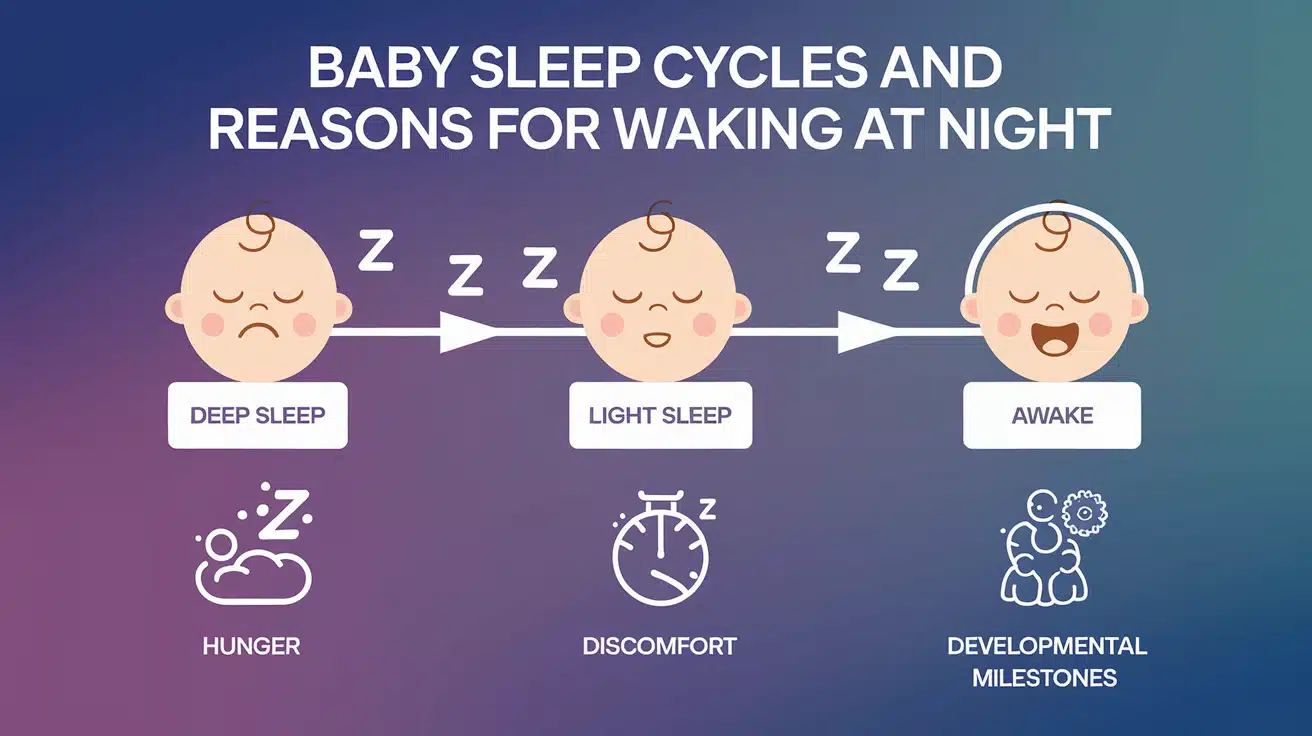Let me tell you what I know about 5-month-olds and their sleep.
At this age, most babies sleep 12-15 hours daily. That’s about 10 hours at night and 2-3 naps during the day.
But here’s the truth – not all babies follow this pattern. Some nights are harder than others.
Your baby might sleep well for a few days, then wake up every hour. I know how tired you feel. I’ve been there too.
Every baby is different, and that’s okay. You’re not doing anything wrong if your little one wakes up often.
Want to know what’s causing those night wake-ups and how to help? I’ll share everything I’ve learned.
Common Reasons for a 5-Month-Old Waking Up at Night
1. Growth and Hunger
Let me tell you what I see in my work with babies. At 5 months, babies grow very fast and get hungry more often.
Think of it like this – their tiny tummies are like small cups that need filling more often when they’re growing.
What I see in hungry babies:
- They drink milk faster than before
- They cry for food more often
- Their clothes feel tighter
- They seem hungry even after eating
What you can do:
- Feed them more during the day
- Make sure they finish each feeding
- Write down when they eat
- Ask your doctor how much food they need
2. Teething Discomfort
When teeth start coming in, it hurts! I often see this around 5 months. The pain often feels worse at night when babies lie down.
Signs I look for:
- Lots of drool
- Red, puffy gums
- Putting everything in their mouth
- Not eating as well as usual
- Being fussy and upset
Things that help:
- Cool teething rings from the fridge
- Soft, cool washcloth on their gums
- Gentle gum rubs with a clean finger
- Regular feeding times
- Comfort and patience
3. Developmental Milestones
Wow, 5-month-olds learn so many new things! They’re learning to roll over, push up, and grab toys. Sometimes, they wake up to practice these new skills – even at night!
What babies are learning:
- How to roll over
- How to push up on their hands
- How to sit with help
- How to grab things
- How to make new sounds
To help with sleep:
- Let them practice new skills a lot during the day
- Make their crib safe for moving around
- Help them if they get stuck
- Use safe sleep clothes
- Remember – this won’t last forever
4. Environmental Disturbances
Your baby notices things we might not even think about! I see this all the time at work. Little things in their room can wake them up at night.
What can wake your baby:
- Car sounds outside
- Light coming through windows
- Room too hot or cold
- Noisy family members
- Pet sounds
What works well:
- Use a sound machine for steady background noise
- Make the room very dark
- Keep the room not too hot, not too cold
- Put up thick curtains
- Ask the family to be quiet near the baby’s room
- Keep pets in another room at night
5. Illness or Discomfort
Sometimes, babies wake up because they don’t feel good. After seeing many babies, I know the signs to look for when they’re not feeling well.
Signs to watch:
- Crying differently than usual
- Touching their ears a lot
- Runny or stuffy nose
- Coughing or sneezing
- Warmer than usual
- Not wanting to eat
What you can do:
- Feel their forehead for warmth
- Check if their diaper is wet
- Look for any rashes
- Watch how they breathe
- Call your doctor if you’re worried
6. Overstimulation
You know how you feel when you’ve had a very busy day? Babies feel the same way! They often have trouble sleeping at night when they do too much during the day.
Signs of an overtired baby:
- Extra fussy
- Rubbing eyes a lot
- Moving around more than usual
- Fighting sleep
- Crying more than normal
How to help:
- Make bedtime quiet and calm
- Turn down the lights
- Speak in soft voices
- Stop playing exciting games before bed
- Follow the same bedtime routine every night
These steps help your baby’s brain know it’s time to rest. Remember, every baby is different, and what works for one might not work for another. Trust yourself – you know your baby best!
How to Establish a Good Sleep Routine
Importance of Bedtime Routine
Listen, I know bedtime can feel like a battle sometimes!
But I’ve found that keeping things simple works best. Start your routine at the same time each night, let’s say 7 PM.
Give your little one a warm bath (not too hot!), put on comfy PJs, and read a short book. Maybe sing a quiet song, too.
You don’t need anything fancy – do the same steps in the same order every night.
Think of it like teaching your baby to read the signs that say, “Sleep time is coming!”
I tell parents to keep it short – about 30 minutes total. Too long, and your baby might get too tired!
Creating a Sleep-Friendly Environment
Let’s talk about making your baby’s room just right for sleep.
In my experience, babies sleep best in a room that’s a bit like a cozy cave – dark and quiet.
Use dark curtains or blinds to block out light. The room should feel comfortable – not too hot or cold.
I always tell parents to use a night light that’s not too bright – just enough to see during diaper changes.
And here’s a tip I swear by: a sound machine can help block out noise from the rest of the house.
Keep toys out of the crib – we want your baby to know their crib is for sleeping, not playing.
Effects of Daytime Naps
Here’s something that surprises many parents I work with: good nighttime sleep starts with good daytime naps!
Babies who skip naps or nap at odd times often have trouble sleeping at night.
I see it all the time – an overtired baby sleeps worse!
Watch for sleepy signs like eye rubbing or fussiness. Most 5-month-olds need 3-4 naps a day.
Don’t let your baby stay awake too long between naps – about 2 hours is enough.
And try to have a mini-routine before naps, like a quick book or song. This helps your baby understand it’s rest time.
Feeding Strategies to Encourage Longer Sleep Periods
Hi there! Let’s chat about feeding and sleep – two things that go hand in hand for your baby.
As someone who’s helped many families with this, I’ll share what works.
Balancing Feedings with Sleep
Let me share a secret I’ve learned – well-fed babies tend to sleep better! Think of your baby’s tummy like a tiny fuel tank that needs regular filling. During the day, try to give good, full feeds every 2-3 hours.
What I tell parents to try:
- Watch your baby eating, not the clock
- Make sure they’re really awake for feeds
- Look for signs they’re full, like pushing away
- Keep daytime feeds in bright rooms
- Play a little after feeds to keep them awake
If your baby falls asleep while eating, try gently tickling their feet or changing their diaper halfway through. This helps them get a full meal!
Introduction of Solids
Let’s talk about starting solid foods! Your doctor might say it’s okay around 6 months when your baby can sit up and show interest in your food.
Here’s what works well:
- Start with simple foods like plain rice cereal
- Feed solids after breast milk or formula, not before
- Try new foods in the morning, not at night
- Keep first tastes tiny – just a spoonful
- Wait 3-4 days between new foods
Remember, food before one is mostly for fun! Milk is still your baby’s main source of food.
Night-Time Feeding Techniques
Nobody likes being up all night!
Here’s how to make night feeds quick and quiet:
- Keep the lights low – just enough to see
- Change the diaper only if needed
- Keep talking to a whisper
- Don’t play or make eye contact
- Put baby back down when drowsy but awake
I give all parents a tip: Keep everything you need close by – diapers, wipes, burp cloths. This way, you’re not hunting for things in the dark!
When to Consult a Paediatrician
Here’s my guide on when to call your baby’s doctor about sleep issues. As someone who works with babies, I know it can be hard to decide when to get help.
- Call if your baby’s sleep pattern changes significantly within 1-2 days of being normal.
- Contact your doctor when your baby wakes up with loud crying and can’t be soothed within 10 minutes.
- Seek help if your baby feels hot, looks pale, or acts differently than usual during night wake-ups.
- Talk to your doctor if your baby stops eating well or refuses multiple feeds during the day and night.
- Get medical advice if your baby’s sleep problems start after a fall or bump to the head.
- Call if your baby has trouble breathing, makes unusual noises, or looks blue during sleep.
- Schedule a check-up if your baby seems very tired during the day, even after a normal night’s sleep.
Tips for Managing Night Waking
- Wait a few minutes after hearing your baby cry. Often, they’ll settle back to sleep without help.
- Use only dim light for diaper changes. Keep the room dark to help maintain sleepiness.
- Pat your baby’s back gently instead of picking them up. Light touch can soothe them back.
- Do a quick check: Diaper, temperature, comfort. Skip feeding unless it’s scheduled feeding time.
- Stay silent during night care. Avoid eye contact and talking to prevent full wakefulness.
- Place baby in the crib while drowsy. Let them fall asleep in their own space.
- Set the same bedtime daily. Follow identical steps each night to build sleep habits.
Conclusion
Thank you for reading through my guide on 5-month-old sleep patterns!
After helping hundreds of families, I can say that every sleep challenge has a solution.
Sometimes, it just takes time to find what works. The key is to stay steady with your approach.
Check basic needs, keep nights calm and dark, and follow a simple bedtime routine.
Remember that most sleep troubles don’t last forever. Your baby is learning and growing every day.
If you’re worried, trust your gut and talk to your doctor. You’ve got this!
Frequently Asked Questions
What is the best time to start a bedtime routine?
Start your bedtime routine 30 minutes before sleep time. Most babies this age do well with bedtime between 6:30-7:30 PM.
How do I know if my baby is getting enough sleep?
Watch your baby during the day. A well-rested baby is usually happy, feeds well, and stays awake between naps. Tired babies often get fussy and rub their eyes.










